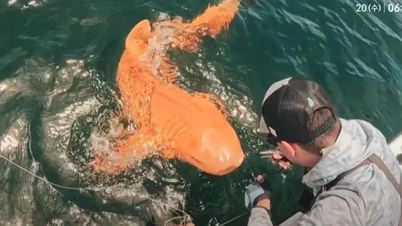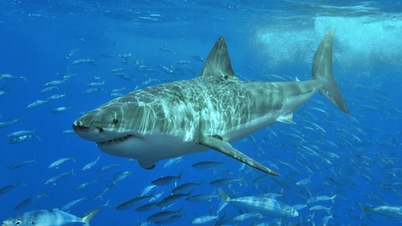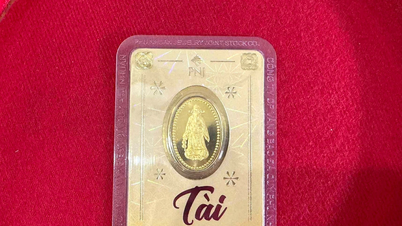A recent study from Heinrich Heine University Düsseldorf, Germany has warned of a serious threat to the survival of sharks due to the impact of ocean acidification.
Accordingly, shark teeth can be seriously damaged in acidified seawater environments - an inevitable consequence of future climate change.
The team tested 16 intact teeth from blacktip reef sharks in two different seawater environments. One had a pH of 8.1, which is similar to current ocean conditions, and the other had a pH of 7.3, which is predicted to be the ocean's condition in 2300.
After 8 weeks of testing, the results showed that the teeth in the highly acidic environment showed significant signs of damage such as cracks, holes, root erosion, and overall deterioration.
Notably, tooth circumference in this environment increased by an average of 0.73 mm - nearly twice that of teeth in normal conditions, reflecting severe structural degradation.
"Shark teeth, despite being made of highly mineralized phosphates, are vulnerable to future ocean acidification," said Dr Maximilian Baum, lead author of the study. "They are highly evolved weapons for cutting flesh, not for resisting ocean acidification."
Although sharks have the ability to continuously regenerate their teeth throughout their lives, scientists warn that this natural adaptive mechanism may not be enough to offset the effects of long-term exposure to acidifying environments.
Since the Industrial Revolution, the average pH of surface seawater has decreased by 0.1 units.
Forecasts show that this number could continue to drop to 7.3 by 2300, seriously threatening the existence of many marine species, including apex predators such as sharks./.
Source: https://www.vietnamplus.vn/bien-doi-khi-hau-de-doa-vu-khi-tu-nhien-cua-ca-map-post1058403.vnp




![[Photo] General Secretary To Lam attends the opening ceremony of the National Achievements Exhibition](https://vphoto.vietnam.vn/thumb/1200x675/vietnam/resource/IMAGE/2025/8/28/d371751d37634474bb3d91c6f701be7f)

![[Photo] National Assembly Chairman Tran Thanh Man holds talks with New Zealand Parliament Chairman](https://vphoto.vietnam.vn/thumb/1200x675/vietnam/resource/IMAGE/2025/8/28/c90fcbe09a1d4a028b7623ae366b741d)




























![[Photo] Images of the State-level preliminary rehearsal of the military parade at Ba Dinh Square](https://vphoto.vietnam.vn/thumb/1200x675/vietnam/resource/IMAGE/2025/8/27/807e4479c81f408ca16b916ba381b667)































































Comment (0)